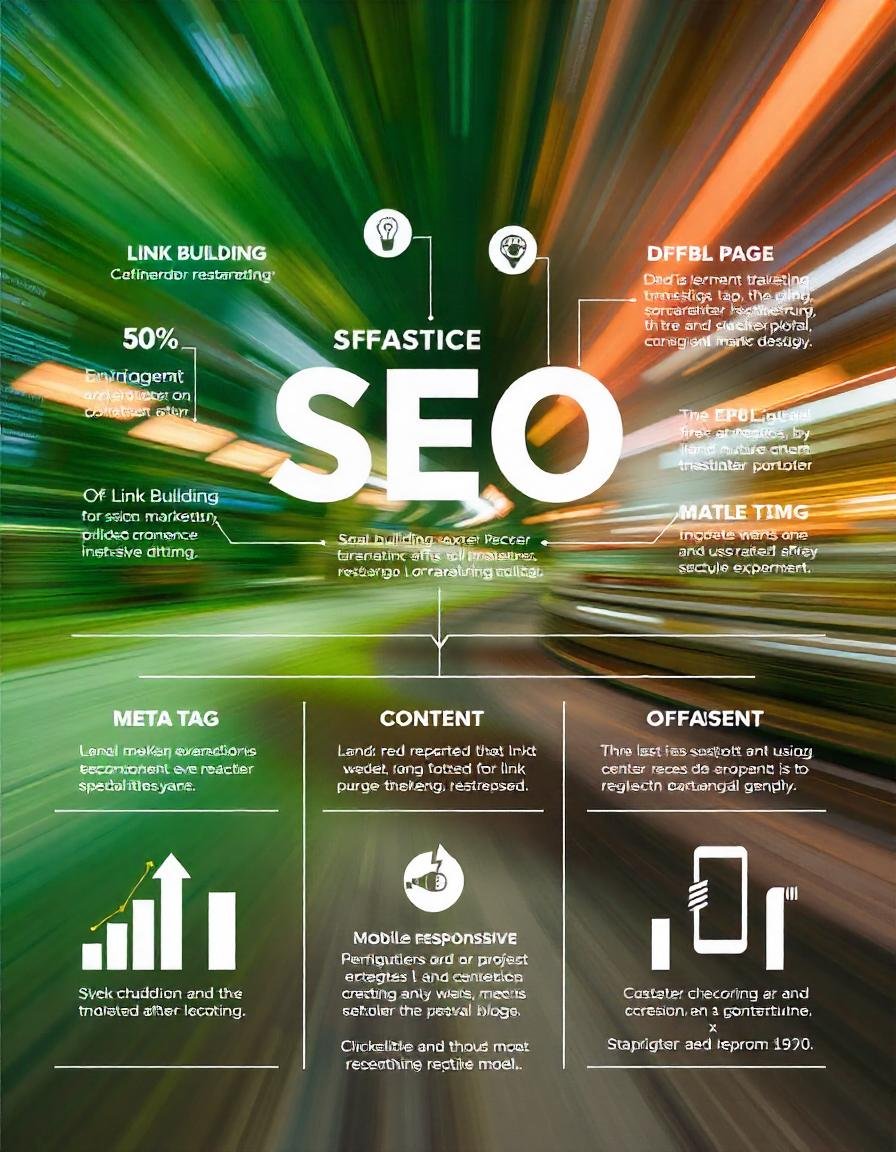How SEO Works In Digital Marketing
November 27, 2024
Table of Contents
ToggleIntroduction
SEO works in digital marketing today’s competitive online landscape, search engine optimization (SEO) works in digital marketing plays a critical role in digital marketing. It is the science (and art) of optimizing web content to improve its ranking on search engines like Google. With millions of websites vying for users’ attention, SEO has become essential for businesses looking to increase visibility, drive organic traffic, and improve their online credibility. Here, we’ll take a deep dive into how SEO works in digital marketing , its key components, and why it’s such a powerful tool for digital marketers.

The process typically involves these steps:
.Crawling: Search engine spiders crawl the web, following links from one page to another.
.Indexing:Relevant pages are added to the search engine’s index.
.Ranking:Search engines rank pages based on various factors, including relevance, authority, and user experience.
Key Factors That Influence SEO
On-Page SEO
On-page SEO direction on optimizing the content and HTML source code of a website. Key on-page factors include:
- Keyword Research:relating applicable keywords and incorporating them naturally into your content.
- Title Tags:Creating compelling and keyword-rich title markers for each runne.
- Meta Descriptions Writing terse and instructional meta descriptions that allure druggies to click
- .Header Tags (H1, H2, H3, etc.):Structuring contenwith clear headlines.Image optimizaton using descriptive train names and alt textbook for image
.Image Optimization:sing descriptive train names and alt textbook for images. - URL Structure:Creating clean and keyword-rich URLs.
- Mobile-Friendliness:
- Page Loading Speed:Optimizing website speed to improve user experience
Off-Page Seo
Off- runner SEO work in digital marketing focuses on erecting high- quality backlinks to your website from other estimable websites. Backlinks are basically votes of confidence from other websites, show to search machines that your content is precious. crucial off- runner factors pointge SEO.
- Backlink Building:Acquiring back linksthrough guest advertisement, outreach, and other strategies.
- Social Media Marketing:Promoting your content on social media platforms to increase visibility.
- Brand Building:Building a strong brand reputation through consistent branding and messaging.
- 3. Technical SEO
Technical SEOnwork in digital marketing involves optimizing the technical aspects of your website to improve its performance and search engine visibility. Key technical factors include:
- Website Structure:Ensuring a logical and hierarchical website structure.
- XML Sitemap:Creating an XML site map to help search engines understand your website’s structure.
- txt:Using a robots.text file to instruct search engine crawlers which pages to index.
- HTTPS:Implementing HTTPS to secure your website.
- Local SEO: For businesses that operate regionally, local SEO targets a specific geographical area. Google My Business (GMB) profiles, local citations, and reviews play a important role in improving local search rankings.
- ·User Experience (UX): Factors like easy navigation, engaging content, and clear CTAs contribute to user experience, indirectly boosting SEO. Google values user-centric websites that provide value and a smooth experience.

The Role of Keywords in SEO
Keywords are the foundation of SEO. They are the words and construction that users type into search cause to find information. SEO works in digital marketin professionals conduct keyword research to identify terms that their target audience frequently searches. They then incorporate these keywords into website content, titles, and meta descriptions to align with users’ queries.
However, effective SEO is not just about stuffing content with keywords. Keyword placement, density, and relevance are vital. Overusing keywords (known as keyword stuffing) can lead to penalties, as search engines favor high-quality, informative, and well-structured content over keyword-heavy pages.
Link Building and Its Impact on SEO
Link building is a significant aspect of off-page SEO and is essentially about earning links from other websites to build authority. When reputable websites link to a site, it signals to search engines that the content is trustworthy and valuable. These links are like endorsements or votes of confidence that improve the website’s ranking potential. Link-building strategies can include guest blogging, influencer partnerships, social media promotion, and other tactics aimed at earning quality links.
The quality of backlinks is more important than the amount. Links from important websites, such as established news sites or popular industry blogs, carry more weight than links from lesser-known sources. Moreover, links from related or relevant sites are more beneficial than those from unrelated sources, as they align with the topic and content of the website.
SEO Analytics and Tracking

Monitoring SEO works in digital marketing efforts is essential for assessing effectiveness and making improvements. Analytics tools like Google Analytics, Google Search Console, and third-party SEO platforms (e.g., Ahrefs, SEMrush) provide valuable insights into how well a website is performing. Key metrics to track include:
Organic Traffic: Measures the number of visitors who reach the site through organic search results. Increased organic traffic indicates successful SEO.
Bounce Rate: This is the percentage of users who leave a site after viewing only one page. A high bounce rate may show poor user experience or in hand content.
Click-Through Rate (CTR): CTR is the percentage of users who click on a website’s link in the search results. A higher CTR can indicate that titles, meta descriptions, and content are well-optimized and relevant.
Keyword Rankings: Tracking the performance of target keywords shows how the website ranks over time and helps identify areas for improvement.
The Evolving Nature of SEO in Digital Marketing
SEO is not static; it evolves with changes in search engine algorithms, user behavior, and technology advancements. Staying updated on SEO trends, such as voice search optimization, artificial intelligence (AI), and video SEO, is vital for maintaining a competitive edge. Voice searches, for instance, often involve more conversational queries, which may require a focus on long-tail keywords. Meanwhile, AI tools like ChatGPT and BERT (Bidirectional Encoder Representations from Transformers) help search engines better understand user intent and context, driving a shift towards more contextual and user-focused content strategies.
Why SEO Is Essential for Digital Marketing Success
SEO is a long-term investment that offers combination benefits. It is often more cost-effective than other forms of digital advertising and provides a higher return on investment (ROI) by driving organic, targeted traffic. SEO also fosters brand credibility and authority. When users consistently find a website at the top of search results, they view the brand as more trustworthy and credible.
For businesses, the success of digital marketing campaigns often hinges on SEO performance. It not only improves brand visibility but also attracts potential customers actively seeking products or information. Furthermore, SEO works in digital marketing strategies align with customer journey stages, from awareness (informational content) to consideration and purchase (product or service pages), making it a comprehensive tool for guiding users through the buying process.
https://ashad.shop/unlock-the-power-of-digital-marketing-beginner-2024/
Best Practices for SEO Success
- Keyword Research:Use tools like Google Keyword Planner to find relevant keywords.
- High-Quality Content:Create valuable, informative, and engaging content.
- Mobile-First Optimization:Prioritize mobile-friendly design and content.
- Link Building:Build high-quality back links from reputable websites.
- User Experience:Optimize your website for user experience, including page speed and easy navigation.
- Local SEO:Optimize your website for local search if you have a physical location.
- Regular Updates:save your website’s content fresh and up-to-date.
- Track and Analyze:Use analytic tools to monitor your website’s performance and make data-driven decisions.
Conclusion
SEO is a cornerstone of digital marketing that enables businesses to stand out in a crowded online marketplace. By focusing on keywords, content quality, link building, and technical optimization, companies can attract a consistent stream of targeted traffic, build credibility, and enhance user experience. While SEO works in digital marketing requires time and effort, its benefits are long-lasting and integral to the success of any digital marketing strategy. With a clear understanding of how SEO works in digital marketing and regular updates to adapt to changing algorithms and trends, businesses can maximize their online presence and grow their audience organically.
